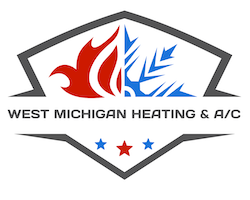
If you’re questioning whether your Hudsonville home has poor indoor air quality (IAQ), it likely does.
We are indoors a lot. In reality, we’re indoors up to 90% of the time, according to the U.S. Environmental Protection Agency. And the air inside homes could be 2–5 times worse than outdoors, which could create long-term health issues.
Most Common Sources of Bad IAQ
We’ve compiled a list of the most frequent sources of bad IAQ, the issues they create and how you can remedy these indoor air pollutants. If you’re worried about the air inside your residence, we suggest chatting with a professional like West Michigan Heating & Air Conditioning Services about which solutions are best for your family.
Volatile Organic Compounds
Volatile organic compounds, or VOCs, are chemicals leaked by everyday household products.
They’re found in paint and stains as well as:
- Furniture
- Carpet
- Building materials
- Cleaning products
- Cosmetics
- Air fresheners
- Candles
When these chemicals accumulate indoors, they may irritate your eyes, nose and throat. They can also cause headaches and nausea. Regardless of whether your residence is in a rural or industrial location, an EPA study found indoor levels of these chemicals can be 2–5 times higher than the air outside your home.
Always follow the manufacturer’s guidelines when using paint or cleaning supplies. Unlatching a window can help chemicals dissipate faster.
Air purification systems can also better your air. This unit partners with your heating and cooling unit to freshen indoor air. When hunting for a model, ensure it’s specifically created to wipe out VOCs.
Dust and Pet Dander
Dust and pet dander can aggravate health problems like asthma and allergies, especially when it continually gets redistributed by your house’s comfort equipment. While you can vacuum more routinely and buy an improved air filter, an air filtration system might be a better match.
This equipment hooks to your comfort equipment to provide strong filtration. Some models provide hospital-level filtration for getting rid of particles and bioaerosols.
Lingering Odors
New houses are closely sealed to enhance energy efficiency. While this is good for your energy expenses, it’s not ideal for your IAQ.
Stuffy odors can stick around for a greater amount of time as your home is pulling in reduced fresh air. As keeping your windows open throughout the year isn’t an option, here are two approaches you can make your indoor air smell better.
An air purification system is placed in your ductwork to eliminate odors before they recirculate. Find one with a carbon filter and the ability to wipe out damaging VOCs. These systems can also help keep your loved ones healthy by getting rid of most bacteria and ordinary allergy triggers like pollen and mold spores.
A ventilation system removes musty indoor air and substitutes it with clean outdoor air. There are two models of units (heat recovery and energy recovery), so check with our professionals for more information on which solution is ideal for your home.
Uneven Humidity
It’s important your residence’s humidity keeps even. Air that’s too moist can lead to mold, while dry air can create respiratory issues.
Our techs suggest 40–50% for the best comfort. To keep yours in balance, consider getting a whole-home humidifier or whole-home dehumidifier with your comfort equipment.
Rather than having to drag a humidifier from room to room, this solution delivers even humidity across your house.
Carbon Monoxide
Carbon monoxide is colorless gas you can’t smell. It’s caused by insufficient combustion in fuel-burning units, like gas heating systems, water heaters or fireplaces.
It creates a severe health risk. In little levels, it can create flu-like ailments like headaches and nausea. It may be deadly in heavy levels.
We recommend regular furnace maintenance to double-check your equipment is working smoothly. This work allows our professionals to spot problems before they start, including malfunctions that can lead to carbon monoxide leaks.
The best way to keep your home free of carbon monoxide is to install detectors. These alarms must be on all floors close to bedrooms and living areas.
Better Your Residence’s Air Quality with the West Michigan Heating & Air Conditioning Services Specialists
Aware that your house has inferior air quality but not sure how to enhance it? Or unsure which product is ideal for you? Give our kind HVAC pros a call at (616) 319-1436 or contact us online now. With free estimates and pro support, we’ll help you choose the best option for your family and budget.


